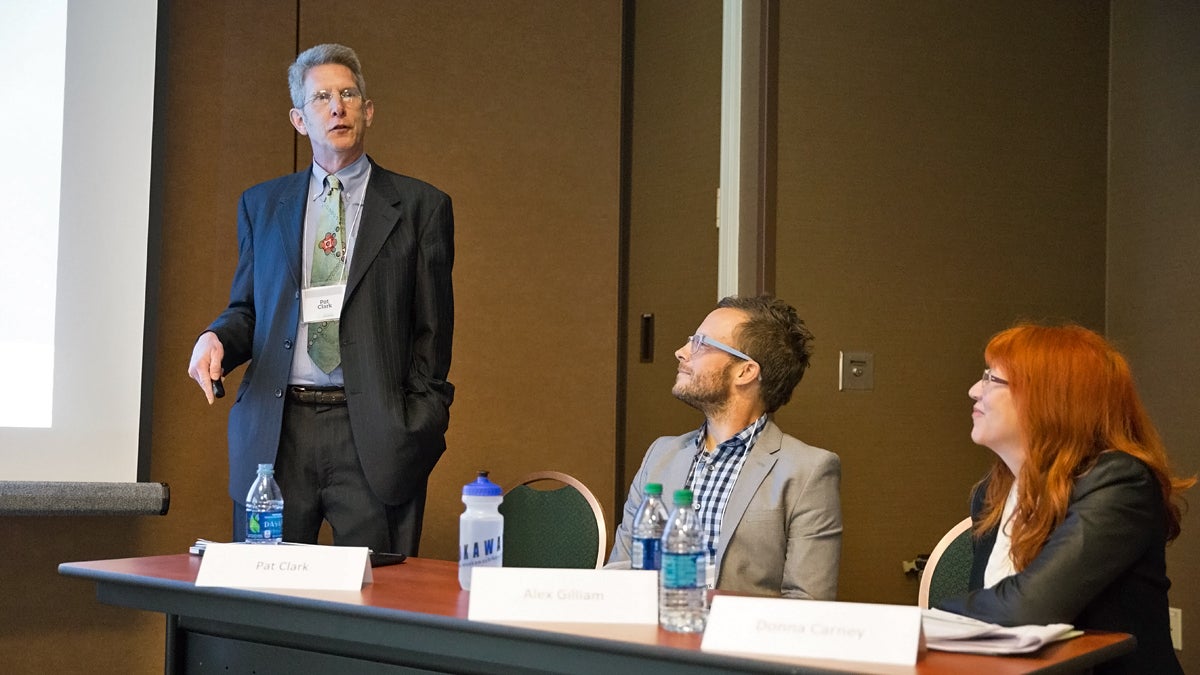Ideas Worth Stealing: Making leaders and strategies to empower urban communities

From left to right: Panelists Pat Clark of Jackson/Clark Partners
The problem with a lot of community planning is that it ignores the community.
Experts parachute in, hold a bunch of engagement sessions, say they are involving the community, listening to feedback and building consensus.
That’s a lot of jargon. Pat Clark, a principal at Jackson/Clark Partners in Pittsburgh, hates that kind of jargon.
Clark and others participated in a panel discussion about strategies to empower urban communities at the recent Keystone Crossroads conference, Urban Ideas Worth Stealing.
Clark led “community censuses” in some Pittsburgh neighborhoods, to develop a sense of what the people there wanted and needed. Clark comes to the world of city planning and community outreach by way of marketing, and takes some marketing lessons to heart, knowing there are limits on how long or intense some surveys can be.
Clark’s first step in a community census? Hiring members of the community to run it. Getting neighborhood buy-in early on is critical to getting honest answers from a truly representative sample of the neighborhood. Talking to just the block captains or already politically engaged population ignores plenty of people who live in these neighborhoods, who are critical to seeing plans succeed. It’s reaching them that matters, a step often missed.
Alex Gilliam takes a slightly different approach to tackling that problem, a problem all of the panelists suggested plenty of more traditional urban planners miss completely. At Public Workshop, Gilliam helps design playgrounds, parks, outdoor classrooms and other institutional spaces for communities. Emphasis on “helps design”: Gilliam recruits the community to join in the entire design process, from blueprint to building.
How does he get neighborhood kids to join in the work? By bringing the work to them: designing playgrounds on site during times of day they’ll be around. By bringing the design workshops to the community, Gilliam bypasses the usual issues of holding them in some standard public forum, like a school: It’s tough to get anyone to sign up for a hypothetical discussion where they’ll talk to some heretofore faceless bureaucrats for an uncertain amount of time. It’s much easier to do it in the space, making it tangible and accessible. Gilliam, quite literally, keeps it real.
While the two other panelists discussed community leadership development in somewhat inchoate terms, focusing on reaching individuals who previously missed out on the calls to participate or become engaged, Donna Carney of Philadelphia’s Citizens Planning Institute (CPI) runs a program specifically designed at taking the already-interested and plugged in citizens and making them more effective advocates for their communities.
(Disclosure: I took the CPI class in 2014). CPI teaches Philadelphia residents the basics of city planning, with courses on the zoning code, for-profit and non-profit development, and other aspects of how neighborhoods change in Philadelphia. A Philadelphia City Planning Commission project that was first funded by a William Penn Foundation grant but is now part of the Commission’s regular operating budget, CPI takes an agnostic approach to teaching residents new skills and tools, which they might then deploy against the Planning Commission’s own proposals.
Such an apolitical approach, combined with years of positive word-of-mouth reviews, has earned Carney and CPI the trust of neighborhoods that often question the motives of city officials. Carney said one of the best thing CPI does is bring neighborhood residents together with city planners and other government officials, humanizing what can often seem like an anonymous, uncaring bureaucracy. When residents and planners alike see that each other cares deeply about their communities, compromise and progress can be made.
Editor’s note: This post has been updated to correct the description of CPI, which was orginally a Philadelphia City Planning Commission project first funded by a William Penn Foundation grant.
WHYY is your source for fact-based, in-depth journalism and information. As a nonprofit organization, we rely on financial support from readers like you. Please give today.


